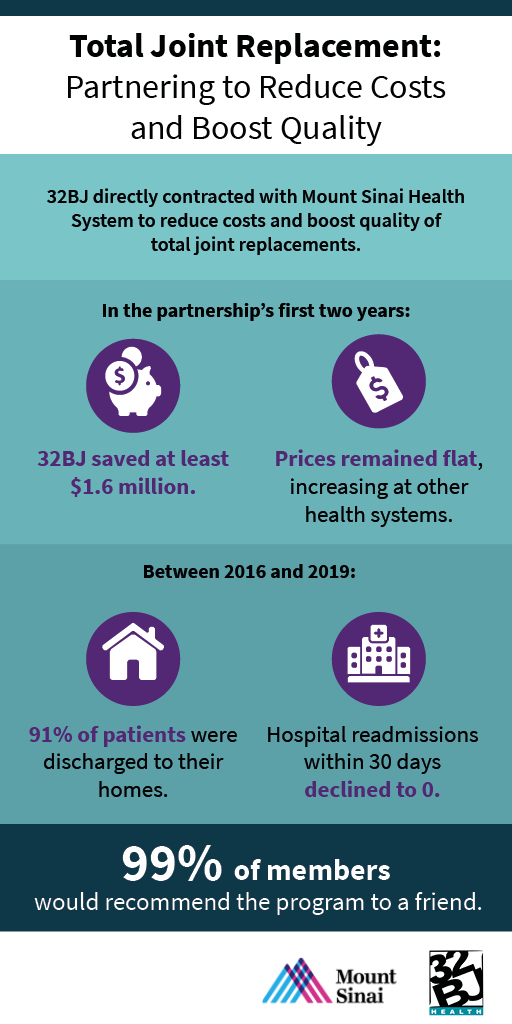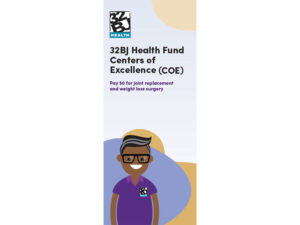A TRUSTED PARTNER WHEN PATIENTS NEED CARE
When its plan participants need hospital care, the 32BJ Health Fund encourages them to go to the hospitals that provide care with the greatest possible value. For patients undergoing total joint replacement (TJR) surgery in New York City, that’s the Mount Sinai Health System.
Proving that higher cost isn’t always associated with higher quality, the 32BJ Health Fund used its own claims data and identified Mount Sinai as a lower-cost but high-quality provider in an otherwise expensive market. Consequently, starting in 2016, the 32BJ Health Fund directly contracted with Mount Sinai to reduce the cost and improve the quality of TJR surgeries.
The contractual relationship with Mount Sinai—rare between providers and self-funded plans like the 32BJ Health Fund—makes the providers directly accountable to the 32BJ Health Fund for the cost and quality of care. The contract stipulates a bundled rate that the 32BJ Health Fund pays Mount Sinai, which incentivizes Mount Sinai to reduce low-value care such as unneeded stays in skilled nursing facilities. The contract is also structured to improve quality, because Mount Sinai is financially responsible for the cost of complications related to the surgery. The 32BJ Health Fund also saves money by encouraging utilization of a health system that is lower cost than other health systems, but still high quality. The partnership is a win-win for the 32BJ Health Fund and Mount Sinai because it only achieves the envisioned value if more patients select Mount Sinai over its competitors. To incentivize plan participants, the 32BJ Health Fund waives copays for hospital admission and follow-up visits when they choose Mount Sinai for TJR.
The incentives also include Care Guides, or trained social workers, who guide patients through the entire process before, during, and after surgery. Prior to a surgery, the Care Guides meet with patients and physicians to assess the patient’s symptoms and address questions. After the procedure, the Care Guides remain connected to patients, helping them transition out of the hospital and mitigate complications. They assist with complex paperwork and monitor recovery so patients can focus fully on recuperating.
Mount Sinai also provides a car service to and from the hospital, lightening the burden for patients who may need transportation assistance to receive care.
“Fundamentally, high-value care is good for business. With the 32BJ Health Fund partnership, we can deliver high-value care and seamless wrap-around services that create an amazing experience for patients, improve economies of scale, and earn greater market share.”
– Lucas Pauls, Plan Sponsor Channel Lead, Mount Sinai
It all adds up to better outcomes for patients, lower costs for the 32BJ Health Fund, and increased market share for Mount Sinai:
- 91 percent of patients went home after surgery instead of going to a skilled nursing facility
- Hospital readmissions within 30 days of surgery declined to zero
- The 32BJ Health Fund saved $1.6 million in the first two years of the program
- Mount Sinai’s market share for 32BJ Health Fund plan participants grew 300 percent from 2016
Patients have noticed the personalized, high-quality care, and 99 percent would recommend the services to their friends and family.
Mount Sinai and the 32BJ Health Fund will continue to identify opportunities to improve outcomes and deliver high-value care.


